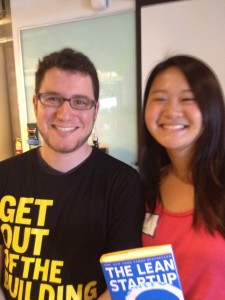Remember the idea I was so excited about yesterday? Yeah, we abandoned it.
Luckily, we had the fun distraction of meeting Eric Ries, author of The Lean Startup, as we were debating new alternatives. His talk was packed with quotable moments like defining vision by asking, “What are the things I am so committed to that I’d rather see the company fail than violate these commitments?” Of course, he was equally clear in saying that the real gems of the Lean Startup methodology aren’t cool slogans – they are the nuanced details that require real, critical thinking.
But back to business.
We settled on a new idea: helping international students find jobs after graduation. Almost immediately, after just a few conversations, we were convinced that we had discovered a much more “painful” problem. We were hearing lengthy explanations of the complexity of their challenges, and even long rants on the struggles of recruiting for international students. Not everyone had the same degree of pain, of course, but every single interviewee converged on a single challenge: inability to reliably determine which companies are willing to sponsor international students’ H1B visas. Every single person said, unprompted, that they wished they had a list or database with that information. We had validated the problem and the customer (international students without green cards seeking jobs outside of investment banking, accounting, and top-tier consulting).
The next step is “solution testing,” i.e. brainstorming solutions and rigorously testing the assumptions underlying those solutions. We are already in the process, but it has been incredibly exciting. Armed with a good baseline of information – the foundation of what LSM mentor Jason Evanish likes to call the “MVP House” (MVP means minimum viable product) – I can see how rapid iteration can form the rest.
Most importantly, this single day – plus reading The Lean Startup – has transformed the way I think about startups. For example, I suddenly get…
- …why you must actually talk to people… immediately. Between our first and second ideas, our conversations with potential customers completely changed – and showed that the international students had a burning need, whereas people managing relationships were casual about the problem.
- …how difficult it is to be disciplined in experimentation. Who wants to “slow down” and lay out the assumptions to be tested? Yet I’ve realized that assumptions that sneak in are incredibly dangerous – and huge time-wasters.
- …why accelerators/incubators focus on mentorship. I cannot even count the number of times a mentor walked in and just rocked our world. Their insights have saved us hours of work. It’s unreal.
- …that entrepreneurship and startups are addicting. Working from 9am to 11pm feels like nothing. I am literally energized and engaged for the entire time. Honestly, I wish I could do this every weekend and refine my skills – which, coincidentally, is what my teammate Nate is doing.
Lean Startup Machine has already given me more than I could have imagined. I cannot wait to see what amazing new lessons tomorrow brings.
